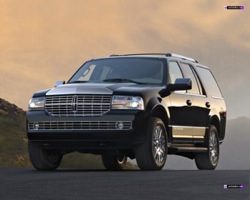 This is a tough time, economically, that’s for sure.
This is a tough time, economically, that’s for sure.
An LA Times op-ed today asks if it’s the end of the road for SUVs, and quotes some data derived from Power Information Network and published in the Wall Street Journal, data which reports that 36% of those who tried to trade in their SUV in May were offered less for it than they owed on its loan. Eek. The WSJ continues:
“The market for large, second-hand SUVs is going through its own version of the mortgage market’s meltdown — and for some of the same reasons. GM’s Hummer H2s and Chevy Tahoes and Toyota’s Sequoias were adjuncts to a lifestyle built on cheap energy. Because gas was cheap, living farther from work in order to buy a larger home in a former corn field (or desert) was a reasonable economic decision. Shuttling 100 miles a day from school to work to mall to Costco was a trivial expense — $10 or so when gas was $1.50 a gallon. You could spend more supplying all your passengers with 20-ounce bottles of Coca-Cola.”
Later in the same piece:
“In other words, folks who bought a big SUV in 2005 are discovering that they were making a bet that oil prices would remain stable. They were wagering $30,000 to $40,000, not the billions certain U.S. auto makers stand to lose from making a similar wager. But the pain of losing that bet is still real. There hasn’t been such a significant collapse in demand for a class of vehicles since the oil embargoes and inflation of the 1970s slaughtered muscle cars.”
I have to be honest. I’m in this boat. Many people like me bought an SUV in 2005: they were on sale for some fantastic prices and they’ve cost us a fortune to drive ever since. Do I love it? Absolutely. But it’s not cheap, and – like many others in the past few months – I fully plan to drop the thing in favour of a 2009 Toyota Prius hybrid, which will improve my gas mileage from around 15 miles per gallon at present to maybe 50 or 60 miles per gallon or better with the improvements expected in the ’09 model Prius (the current model Prius averages 47) and thus save me maybe $200 or more in gas every month.
Are SUVs in general a thing of the past? I really don’t think so. For one thing, they’re fantastic, and people love them (nothing matches for comfort, luxury, space, convenience). And for another, we’re devising better and cheaper ways of pushing larger and larger vehicles around with new technologies (like hydrogen fuel cell, electricity, cellulosic ethanol) which won’t cost anywhere near as much to run. (Not to mention the fact that, if more Americans drive hybrids, the demand for gas will fall and the price of gas come down anyway.)
But I’ll say this: SUVs which run on gasoline at 15 mpg may be a thing of the past. A little fuel crunch may not be such a bad thing, long term. We must remember the strength of the free market system: supply and demand, and the higher prices prompting changes which promise to put an end to the concern about prices. Changes are occurring, and that’s happening without the help (or threat) of government. The end of the gas-guzzler may be imminent, but let nobody dare to think that it’s got anything to do with leftwing values or ending American consumerism. On the contrary, the changes are being defined by American consumerism, and the ultimate answer remains the same as it always was:
Unrestricted capitalism.

